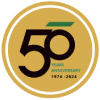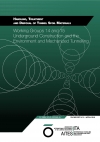Working Group 15 of ITA, represents ITA’s
philosophy on Sustainable Use of the
Underground Space, based on the UN
Brundtland Commission’s definition on
sustainability:
”Development that meets the needs of
the present without compromising the
ability for future generations to meet
their own needs”
The work within the ITA Working Group
15 on Underground Construction and the
Environment, might be divided into three
categories with focus on
• Environmental opportunities by going
underground
• Environmental challenges by going
underground
• Environmental Guidelines and
Recommendations when going
underground
This report on excavated material from
tunnels and underground caverns belongs
to a set of reports from ITA’s Working
Group 15 on “Underground Construction
and the Environment”. It also benefits
from the considerable reports and input
from Working Group 14 – Mechanized
Tunnelling.
The set of reports produced and planned
by WG 15 is :
• Environmental and Sustainable
Development Reasons for Going
Underground (presented and issued in
Vancouver 2010)
• Excavated materials (this report)
• Noise and vibrations (under preparation)
• Water related issues
• Architecture and aesthetics
For collection of relevant information on
tunnel muck handling, treatment and
disposal, a questionnaire was distributed to
the member nations. Altogether information
from 59 different projects were received,
covering USA, Europe, Asia and Australia.
Also, research programs like the DRAGON
Project (Reference 1, a joint cooperation
between Austria, France, Germany,
Switzerland and UK) and the “Re-Muck”
program in Italy (Reference 2) on utilization
of excavated materials from tunnels,
presents innovative methods for ecocompatible
and sustainable recycling
of tunnel muck. Both programs give
immediate evaluation of the rock quality at
the excavation face for finding most suitable
treatment techniques and strategies for
TBM excavation.
In addition, cases from Taiwan (aggregates,
earthworks, shore protection and land
reclamation) and Australia (Northside
Storage Tunnel Project), England (Crossrail
Project), Switzerland (Farettes Hydropower
Project and the Gotthard Base Tunnel),
and Italy (mechanized tunnelling with EPB
TBMs) have been selected as examples
on opportunities and challenges related
to tunnel muck. Table 1 below lists the
projects referenced, illustrated or described
in detail in the following sections of the
report.
Handling, Treatment and Disposal of Tunnel Spoil Materials
- Published in: 2019
- Author: Working Group 14 & 15
Download document


